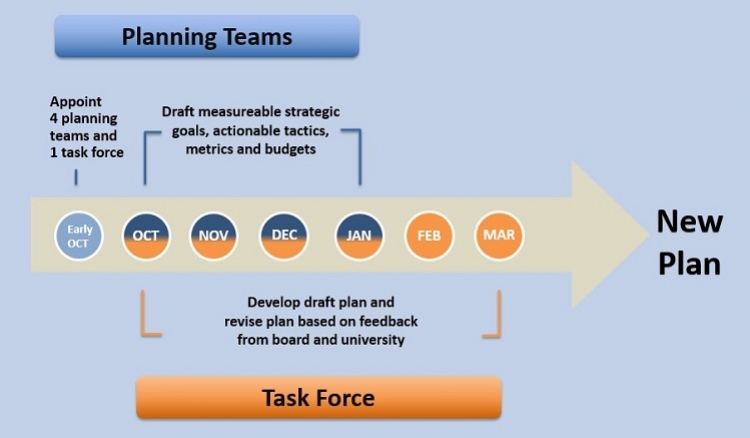 Four Planning Teams and a representative Strategic Planning Task Force are being assembled as DePaul begins envisioning its future through 2024. (Graphic by Rina Bongsu-Petersen)
Four Planning Teams and a representative Strategic Planning Task Force are being assembled as DePaul begins envisioning its future through 2024. (Graphic by Rina Bongsu-Petersen)
DePaul President A. Gabriel Esteban, Ph.D., set the university's next strategic planning process in motion with his first annual State of the University address. Now, a formal structure is taking shape to support the innovative thinking that will guide DePaul's future.
This structure rests on three pillars: a representative Strategic Planning Task Force, four thematic planning teams and university-wide input working in tandem to produce an ambitious, well-balanced plan.
"Any plan worth doing has to come from the people who will be doing it," Dr. Esteban said during a recent meeting with College of Communication faculty and staff.
The task force and planning teams will include faculty, staff and students from across the university, according to Jay Braatz, vice president for planning and presidential administration. Faculty Council, Staff Council and the Student Government Association just submitted nominees for the task force, and Dr. Esteban is expected to appoint membership to the task force and teams the week of Oct. 9.
The task force will be responsible for crafting a draft plan from recommendations that rise through the planning teams, which will address topics the Board of Trustees requested be considered as the university's work moves forward. They are:
- Strengthening DePaul's mission to serve a diverse community and improving the student experience,
- Increasing enrollment, retention and tuition revenues, while improving student success and career outcomes,
- Strengthening the academic program portfolio and faculty development, and
- Improving financial performance to ensure DePaul's sustainability.
"A strong plan will depend on eliciting divergent perspectives and creative new ideas," Braatz says. She anticipates a lively cross-section of faculty, staff and students will attend town hall meetings in October and November on each campus and submit comments on draft plans posted on a strategic planning website currently under development.
"Higher education planning all too often can be driven by budget," Dr. Esteban notes. "At DePaul, I want us to make bold plans and then ask 'how do we create a budget to achieve those goals?' We are not only planning for the next six years, but laying the groundwork for the university DePaul will become over the next century."